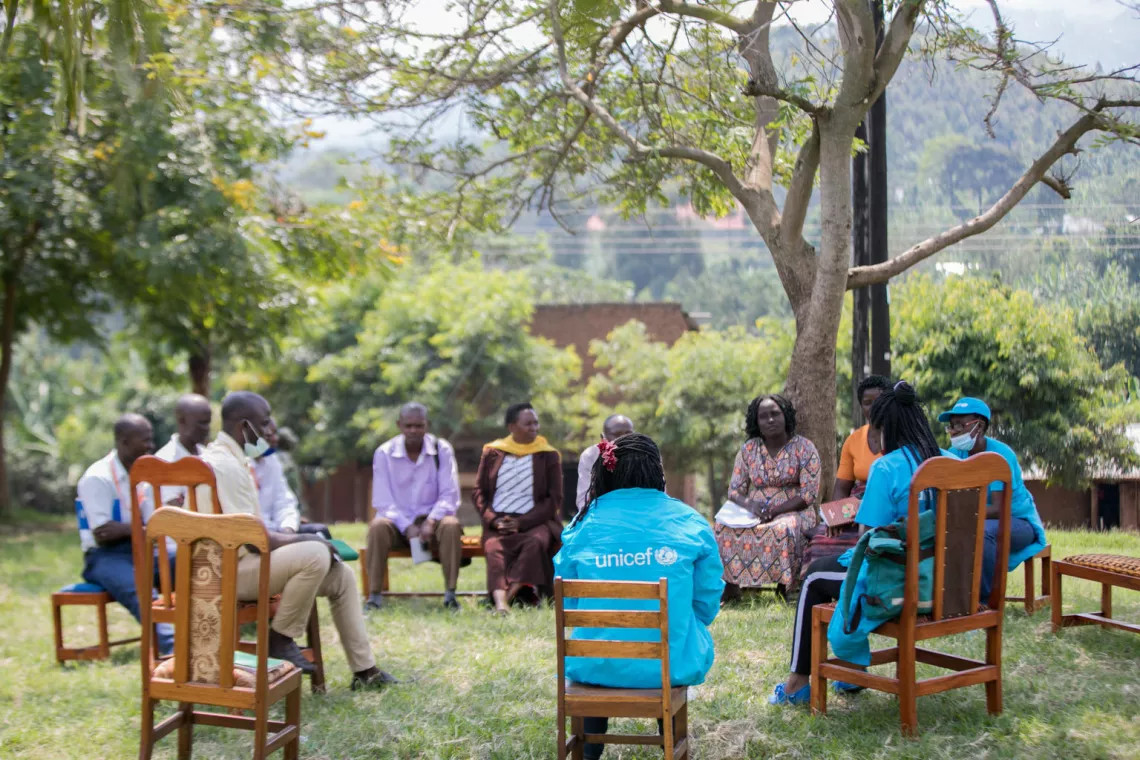COVID-19 pandemic did not deter UNICEF actions in western Uganda
Reaching children with critical services despite the pandemic

The unprecedented challenges posed by the Covid-19 pandemic in 2020 did not derail UNICEF’s interventions planned for the health and educational sectors, thanks to the diligent conduct by the teams that ensured that 2021 found the preparatory groundwork accomplished.
Despite the limited travel restrictions at the onset of the COVID-19 pandemic in Uganda in March 2020, UNICEF teams went ahead to collect all the data required for the Health System Strengthening in western Uganda. The year closed with this having been taken care of.
In Hoima District, UNICEF provided technical support to the Risk Communication, Social Mobilization and Community Engagement - RSCM-CE activities and up to 12 RSCM-CE sub-committee sessions were conducted. 56 sub-country facilitators, 40 district leaders and 350 Village Health Teams were oriented and updated on Covid-19 management while over a thousand dialogue meetings involving thousands of residents were held.

In Kasese and Kyegegwa districts, UNICEF worked with Social Welfare Officers, Education Officers to monitor work on prevention of Violence Against Women and Children –VAWG and strengthening Communication for Development capacity building through trainings. Monitoring the impact of SWOs in child protection activities through data collection also kicked off, with about half of the sub-counties in the districts already covered by year end.
Still in Kasese and Kyegegwa, UNICEF intensified Covid-19 sensitization and left no stone unturned in addition to reaching 398 public health workers and ensuring that mentorships were also conducted in private clinics and drug shops.
According to a UNICEF Mbarara Field Office Report 2020, in Isingiro, Water, Sanitation and Hygiene (WASH) facilities were constructed in ten schools, and these constituted motorized water systems, segregated latrines for both sexes and also segregated mass hand wash stations for boys and girls. Work also started on 15 similar facilities in the districts of Isingiro, Kyegegwa and Kikuube, three of the facilities being in health centres, all to be completed by end of March 2021.
The ‘older’ health problems were also tackled relentlessly, with 148 health workers from Kitagwenda, Kamwenge and Kyegegwa trained in Integrated Management of Acute Malnutrition (IMAM) in line with the updated 2020 guidelines. Subsequently, UNICEF supported the distribution of Ready to Use Therapeutic Food (RUTF) in 25 health facilities.
Not to give HIV/AIDs a chance in the Covid-19 era, the campaign against the disease was re-energized in Isingiro and Kikuube where 175 health workers were mentored on site. Working with Baylor Uganda, UNICEF enabled 338 adolescents to reach health facilities for voluntary testing and counseling.
Not to allow Covid-19 interfere with both Early Childhood Development as well as the older children’s school educational cycles, UNICEF conducted intensive work supporting the learners, teachers and institutions to minimize the interruptions. UNICEF continued to support radio programing to boost radio lessons for ensuring and enhancing learning continuity in Ankole, Toro, Bunyoro and Buganda.
The report notes that UNICEF also supported teachers to conduct door to door home visits to learners in refugee settlements of Kyaka II, Kyangwali, Rwamwanja and Nyakivale.
UNICEF also worked to ensure that candidates are all registered for the upcoming/postponed national exams.
To help give more candidates a chance to revise before the exams, UNICEF supported the processes to make the printed learning material be accessed by learners in many far flung places.
And as the country moves to Continuous Assessment in the Education system, UNICEF also supported the knowledge refreshment of the teachers who had earlier had training in this regard at Kyambogo University. This will enable them to competently handle this important innovation in the country’s education system which is due for implementation.
Uganda thus emerges from the most challenging year with its educational and health interventions in pretty much the same shape as planned, thanks to the uninterrupted execution of UNICEF’s programmes.




